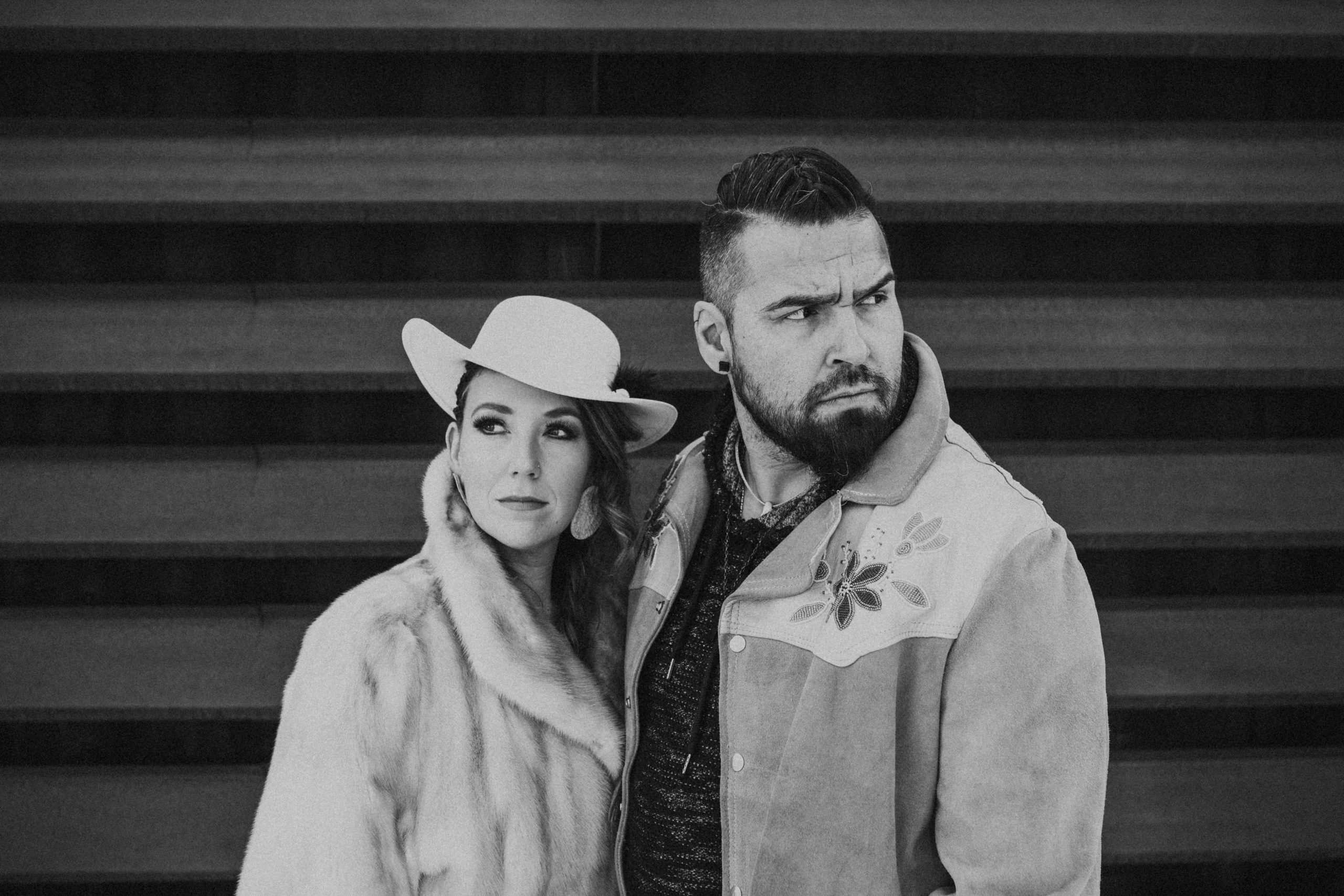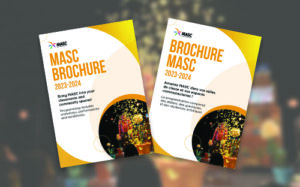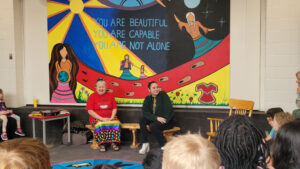Interview: Chelsey June and Jaaji of Twin Flames
By Jessica Ruano | January 5, 2022

This interview was originally published on Apt613.ca
Multi-award winning Twin Flames is led by Jaaji, an Inuk Mohawk man from Nunavik, and Chelsey June, an Algonquin Cree Métis woman from Ottawa. With thought-provoking songs, they gently educate audiences on the realities of Indigenous and Inuit history and current issues. Their newest single “Battlefields” speaks to ending the stigma associated with mental health. In this interview, Jaaji and Chelsey June speak about life as touring musicians and arts educators adapting to COVID-19.
MASC: One thing that is made very obvious in your music and through your social media presence is how TOTALLY IN LOVE you two are. Can you speak to some of the benefits (and perhaps also the challenges) of collaborating full-time with your romantic partner?
We are so fortunate to have found one another. We love working together and complement each other in so many ways. As a couple, we strive to be completely honest with each other in all ways and that crosses over into our professional lives. We are able to give each other constructive criticism and continuously improve our music and songwriting.
When touring, we are always together and we love that. We get to experience incredible moments onstage, and through our travels and all that time together we create shared memories. All tasks are easier because we share them. Owning our own business, creating music, songwriting, social media, press, school workshops, acting, modelling, consulting, raising our children. It feels like we share a brain, and our bodies enable us to get everything done. We still feel like we need clones at times, though!

Twin Flames. Photo provided by MASC.
You had a big tour planned for this year, and cancelling it must have been a serious financial hit, as well as a huge disappointment to you and your fans. How have you managed to adapt and share your music during this pandemic?
It was very difficult at first not knowing what was going to happen, but the unexpected can happen at any time. The whole world is still bracing itself to see what will happen after COVID-19. Will there ever be an “after”? Financially it was a big hit, but many of our shows were postponed, rather than cancelled, which is hopeful. MASC stepped up by paying its artists 50 per cent of their gigs cancelled due to COVID-19, and they helped us provide online school concerts. We have also been very busy with pre-recorded shows for television and performing arts centres. What has kept us the busiest, though, is finishing our new album OMEN due out in August 2020. We built our very own home studio in order to complete it.
Any platform that helps Indigenous voices be heard in our country is so important.
Last year the National Arts Centre launched its first-ever Indigenous Theatre season, and one year earlier 95.7 ELMNT FM, an Ottawa radio station focused on Indigenous recording artists, took to the airwaves. How has this national push towards Indigenous arts affected the way you navigate the music industry?
We feel that any platform that helps Indigenous voices be heard in our country is so important. It is great that these things are happening, but our hope is that one day we will not have to be separated and can be included among other Canadian artists as equals. We believe these platforms are needed to show this country the level of talent and professionalism Indigenous artists can provide, because so many stereotypes still exist. We hope these platforms will help break down those walls.
As a member of MASC, what do you gain through offering your workshops in schools and in the community?
We love working with youth because we truly believe they will be the change that this country still desperately needs. By educating and sharing our stories and the history of Indigenous peoples through music, we have the opportunity to reach youth where they are. We are so fortunate to see the impacts. We have received so much love from the school boards, teachers, and students. Being full-time touring musicians, it is hard to be away all the time. Working with MASC also allows us to be home with our children and live some normality during the school year in between our major tours. We are so grateful for the relationships we have created thanks to MASC.

Chelsey June and Jaaji of Twin Flames. Photo provided by MASC.
Why do you think it’s important for our local community to have access to professional artists?
Growing up, we both wished to have seen more musicians play live. Neither of us knew that this could be a “Real Job” – especially Jaaji who came from way up in the Arctic! Children see us at their school, then later hear us on the radio or come to see us at big concerts like Bluesfest. There are many students, along with their parents, who attend as many local shows as possible. They really love that. We really love it!
Beyond that, Chelsey had learning disabilities as a child and music had always been a safe haven. All children learn differently and it is so important for children to learn what makes them happy and passionate and confident.
Perhaps you’d like to share the love and spotlight! Are there any up-and-coming musicians whose work you would like to promote?
Absolutely! Keep an eye out for two-spirit Cree singer and arts educator Angel Baribeau from Mistassini, Quebec. They have this incredible, transportive voice, and they’re working on releasing their first album. Angel is going places! It’s so great to see our Indigenous youth pursuing their dreams.
Latest News
View All Articles



